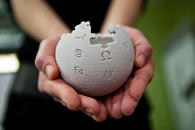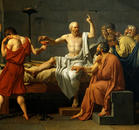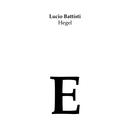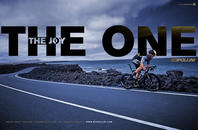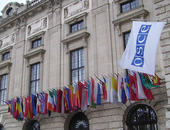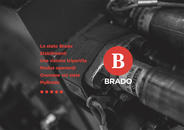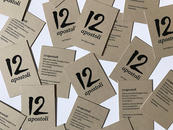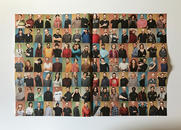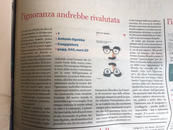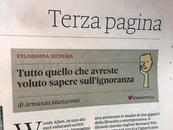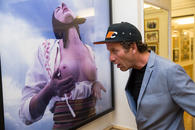A summer of hard work and paltry holidays has come and con in a flash. What remains is a selection of noteworthy and enjoyable projects, or only noteworthy, or only enjoyable, which we present here in our portfolio: from designing the image for The One to the official Cipollini 2017 video, from Libertate to Cuore Iberico, from the 12 Apostoli restaurant to DMT and from the Brado project for Interzum 2017 to the Brado's four websites.
I don’t know
Having not kept up with the “daily headlines” for some time now, I have been forced to respond to anyone who has asked me for an opinion about a crime, a political party, an internet celebrity, a court case, or a political, economic or financial initiative with a long series of “I don’t know anything about this subject.” Due to my enormous and well-conceived lack of information, I'm amazed at how everyone seems to boast his or her own perverted opinion about everything. (Truth be told, I used to think I had an opinion about it all too). I am flabbergasted by the certainty with which people sanction and judge complex issues, which normally requires a high degree of varied and transversal of competence. For single, limited issues, I am sure that Google and Wikipedia offer a descent service, considering that anyone is capable of spinning an issue. But what neither Google nor Wikipedia can offer is just the indispensable intelligence to link issues, to structure connections, to harmonize arguments and notions of a different nature, useful to form a personal opinion with a good approximation of truthfulness, or at least consistency, on any topic: the reality, unfortunately, is maliciously complex, and can never be reduced to an instinctive, lapidary and precise position - apart from the rare cases where evil and good appear in a clear and well-defined moral scale (it happens rarely, and almost always in extreme, dramatic contexts).
Besides the fact that Wikipedia entries are often poorly-written in Italian and lack crucial information for discovering even the basics of a subject, and other times out-right wrong (I have read and reread the entries relating to a couple of subjects I hold dear to my heart), they merely provide segments of knowledge that can serve as a simple assumption of an opinion. In today’s world, opinion appears in the form of the infamous blogs that are being rescued, divided into factions and attending to a strict sense of belonging, in the eagerness of seeing their prejudices confirmed: nothing further from being a useful tool to form an opinion serious and balanced. The epistemological assumption of such virtual instruments can be summarized by Ernst Bloch's quoted well-known quote, reworded by Hegel (obviously stripped of the philosophical sense of idealism and denial of the existence of phenomenal reality): "If the facts contradict my theory, all the worse for the facts." In the end, I am not surprised by the number of poorly-argued prejudices, not to mention plausible beliefs, plausibility also being the fruit of uncertainty.
This said, an article b recently appeared in the Sunday edition of Il Sole 24 Ore written by Armando Massarenti about Antonio Sgobba’s book with the witty title of “?”, accompanied by a subtitle that best illustrates the subject at hand: "The paradox of ignorance from Socrates to Google." Massarenti takes his cue from the numerous articles published in recent years that make a point of Italy's top ranking among OECD countries in functional illiteracy. Functional illiteracy meaning the inability to effectively use basic skills, particularly reading and writing, paired with illiteracy that reoccurs without the exercise of related skills, regressing over time and causing one to losing the ability to use written language to formulate and understand messages. According to the international research, almost 80% of Italians read and write hard with difficulty and for short periods. Compared to the other countries in the industrialized world, only Mexico out-weighs us in functional illiteracy.
But for Massarenti and Sgobba the problem is being looked at incorrectly. Italians aren’t the most ignorant of populations, but they are certainly the most sure of themselves: a country of know-it-alls, unable to accept ignorance for what it is, an enormous sea in which everyone, the educated and the inclined, are forced to navigate. Ignorance is the new normal, not the exception, so therefore knowledge should be considered abnormal. It seems like a paradox, but it is not if we think of "the immensity of things in the world," to say it in a simple way. Ignorance, in its immensity, is not definable, nor measurable, nor can it be indexed. It’s not possible to say exactly what we are ignorant of, since saying that one doesn’t really know something means that they know it in some way or another.
However, one must distinguish between ignorance and error. It’s much better to be ignorant than to swear you know everything, with your head full of wrong ideas. The index of ignorance does not actually index the ignorance of the various countries, but their mistakes. Ultimately, Italians are not ignorant: Italians are wrong. We should consider cases of ignorance only those where the respondent does not answer or doesn’t know the answer, but these are very rare. Often, to fill the voids, we respond with hypotheses or supposed knowledge, which is almost always the result of preconceptions. The clearest index of ignorance is the inability to convincingly answer reasonable questions, but finally to answer the same. Rather than uttering a simple, and ultimately liberating, "I don’t know."
29/09/2017 Filippo Maglione



